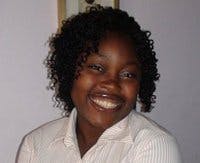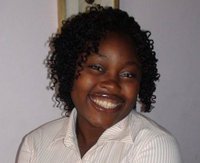Living for "What Can Be"!
Jan 21, 2015
Story


“I’ve had nothing to eat today,” the young woman says, averting her head to hide her shame. Bukky places a hand on her shoulder and together they walk to Kuti Hall, where there is a popular food joint. The young woman orders a Kuti-burger—an inexpensive bread-and-egg ensemble. Bukky gets one, too, and pays.
The young woman expresses her thanks and continues on, just another well-dressed student on her way to class, holding her lunch and her dreams in their hands.
Nary a day goes by that Bukky Shaba is not reminded of the challenges facing her generation. Some as basic as hunger. Some as prevalent and inhibiting as poor educational facilities. But Bukky believes that given the chance, youth can turn the tide in Nigeria.
Twenty year-old Bukky is a final-year Broadcasting student at the University of Ibadan (UI) in Nigeria, preparing to be a voice for the unheard in her society. Bukky’s own voice was refined in the school of hard knocks. The last of six children, her parents sent her to a boarding school when she reached secondary school age so that she could have access to the best education they could afford. It was there that Bukky discovered another side to the world.
“My schoolmates made fun of me because I was fat,” Miss Shaba reveals, able to smile wryly now at the recollection. “I never fought back because my parents had so ingrained in me that there was never a place for violence. But because I was so quiet, people enjoyed picking on me.”
It was a difficult period for Bukky. Behind her bedroom walls, her voice remained vibrant and loud, but in public, Bukky would withdraw into a shell. Fortunately, with the support of her family and Christian youth organization at her school, Bukky was able to weather the storm.
“Because of my experience, I developed interest in people like me, like who I used to be, who cannot voice out,” says Bukky.
As a talk show host for her university’s radio station, Bukky now uses her voice to leverage important social and moral issues. Bukky is also actively involved in the community as Dean of the Outreach Centre in a student-led, nonprofit organization called The F.A.I.T.H. Initiative (TFI). The letters that spell out the word F.A.I.T.H. represent the key competencies of the organization—Funding, Administration, Ideas, Trainings, and Helps. TFI seeks to provide solutions to the multifaceted problems inhibiting Nigeria’s youth from moving forward.
Prior to her involvement with TFI, one of Bukky’s challenges was finding a space in which to cultivate her interests and rub minds with young people who want to bring about change in Nigeria. A new horizon opened up for Bukky when she was introduced to the world of social media. In early 2009 during a salary-related University strike that went on for many weeks, some friends encouraged Bukky to join Facebook, the social networking site.
Soon Bukky had developed a network of like-minded people who are making a difference in their communities. As she read their blogs and Facebook Notes, she was amazed to hear the positive, solutions-oriented tone of their voices. It was so different from the types of conversations she typically heard among her peers regarding the problems in Nigeria. The ideas they shared resonated with the vision she carries for Nigeria’s youth. “I just have a passion to see young people thinking about what can be, rather than dwelling on the challenges of our present situation,” Bukky articulates.
As she talked to people about her ideas, Bukky was introduced to a young man named Faith Abiodun, who had recently graduated from UI and was the founder of TFI. Recognizing her drive, Faith invited Bukky to come onboard as a founding member and the Dean of the Outreach Centre at TFI.
“One of the first projects the Outreach Centre carried out was the Adopt-A-School Initiative,” says Bukky. Having previously heard about Abadina College, a local secondary school in dire straits, Bukky led the effort to help revamp the school. “I met with the principal, vice principal, teachers and some of the students. We identified what the main needs were.”
None of the classrooms had windows or sufficient chairs and desks. There were no usable toilets. A broad stroke of black paint on a wall served as the blackboard in each of the classrooms. Abadina students themselves seemed eager to learn, but their environment is not conducive for learning.
These types of distractions have recently been highlighted as a major cause of mass failure in secondary school exit examinations across Nigeria. In 2010, according to the Nigerian Compass, more than 70% of Nigerian students failed basic requirements in the West African Senior School Certificate Examination, eliciting a cry of outrage across the country. The consistent nosedive of the Nigerian educational system, particularly at the primary and secondary levels, continues to be a top agenda for many NGOs in Nigeria.
Bukky and her team have decided to call attention to the problems at Abadina. The first step in this effort was the creation of a documentary on Abadina College, which is being circulated virally and on DVDs across Nigeria. It is available for viewing on YouTube under the title, “Abadina.”
“What motivates me?” Bukky asks aloud. “The fact that so many people suffer when there is so much abundance.” By this she means not only financial wealth but knowledge, training, and other resources presently inaccessible to the average Nigerian youth.
Bukky believes her career in journalism will give her access to a broader audience and also uniquely position her to facilitate a more even platform for sharing of wealth and knowledge across social, economic, and political divides.
“I would expect that one day soon, the basic needs of people—food and shelter—are met. We’re not even asking for clothes,” she adds with an ironic laugh.
And can you help but dream with her that this day will come soon?
This article is part of a writing assignment for Voices of Our Future, which is providing rigorous web 2.0 and new media training for 30 emerging women leaders. We are speaking out for social change from some of the most unheard regions of the world.




